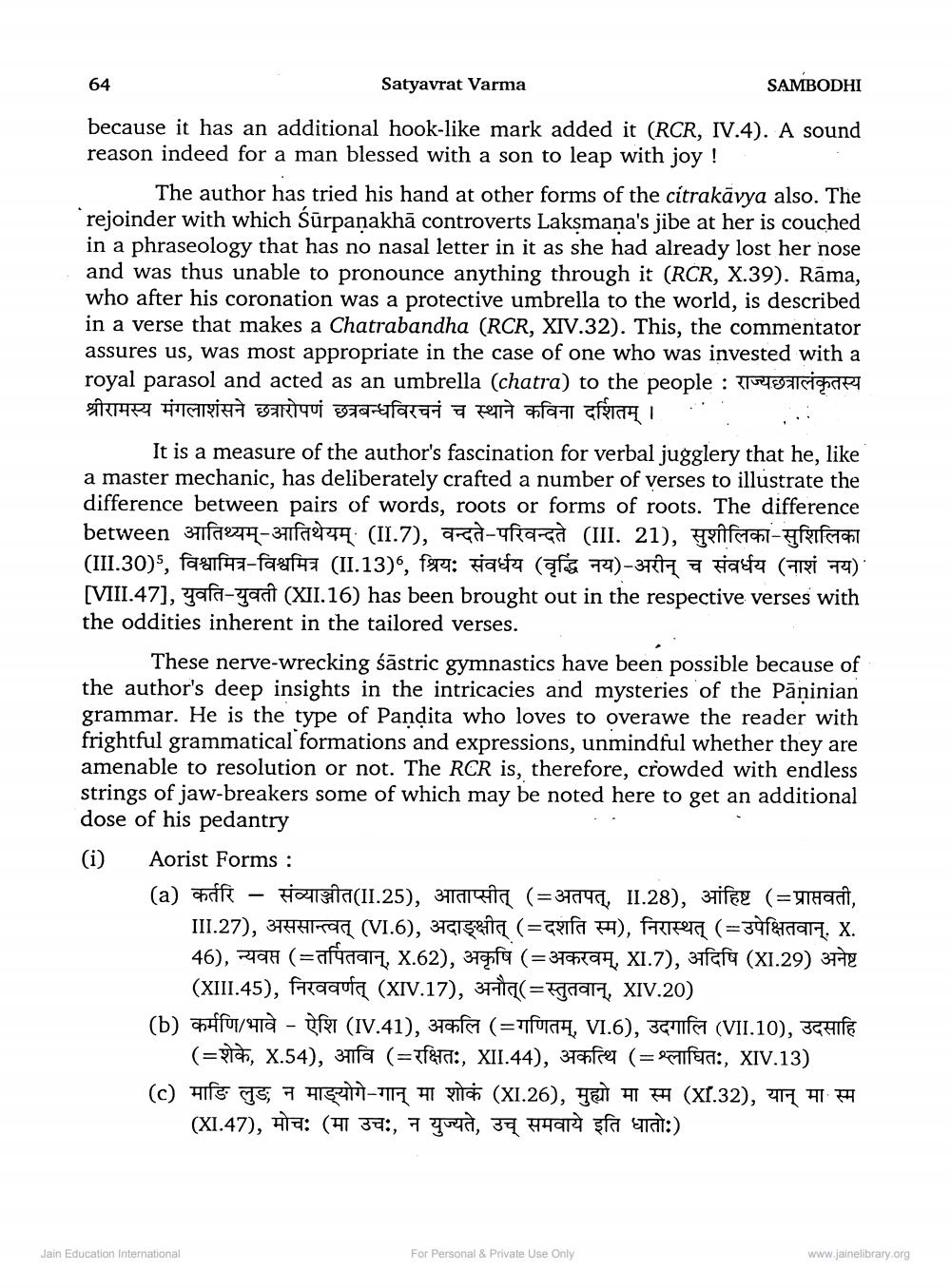________________
64
Satyavrat Varma
SAMBODHI
because it has an additional hook-like mark added it (RCR, IV.4). A sound reason indeed for a man blessed with a son to leap with joy ! A
The author has tried his hand at other forms of the citrakāvya also. The rejoinder with which Sūrpanakhā controverts Laksmana's jibe at her is couched in a phraseology that has no nasal letter in it as she had already lost her nose and was thus unable to pronounce anything through it (RCR,X.39). Rama, who after his coronation was a protective umbrella to the world, is described in a verse that makes a Chatrabandha (RCR, XIV.32). This, the commentator assures us, was most appropriate in the case of one who was invested with a royal parasol and acted as an umbrella (chatra) to the people : राज्यछत्रालंकृतस्य श्रीरामस्य मंगलाशंसने छत्रारोपणं छत्रबन्धविरचनं च स्थाने कविना दर्शितम् । ..
It is a measure of the author's fascination for verbal jugglery that he, like a master mechanic, has deliberately crafted a number of verses to illustrate the difference between pairs of words, roots or forms of roots. The difference between आतिथ्यम्-आतिथेयम् (II.7), वन्दते-परिवन्दते (III. 21), सुशीलिका-सुशिलिका (III.30), विश्वामित्र-विश्वमित्र (II.13), श्रिय: संवर्धय (वृद्धि नय)-अरीन् च संवर्धय (नाशं नय) [VIII.47], युवति-युवती (XII.16) has been brought out in the respective verses with the oddities inherent in the tailored verses.
These nerve-wrecking sastric gymnastics have been possible because of the author's deep insights in the intricacies and mysteries of the Pāṇinian grammar. He is the type of Pandita who loves to overawe the reader with frightful grammatical formations and expressions, unmindful whether they are amenable to resolution or not. The RCR is, therefore, crowded with endless strings of jaw-breakers some of which may be noted here to get an additional dose of his pedantry (i) Aorist Forms :
(a) कर्तरि - संव्याञ्जीत(II.25), आताप्सीत् (=अतपत्, II.28), आंहिष्ट (=प्राप्तवती,
III.27), अससान्त्वत् (VI.6), अदाङ्क्षीत् (=दशति स्म), निरास्थत् (=उपेक्षितवान्. X. 46), न्यवप्त (=तर्पितवान्, X.62), अकृषि (=अकरवम्, XI.7), अदिषि (XI.29) अनेष्ट
(XIII.45), निरववर्णत् (XIV.17), अनौत्(=स्तुतवान्, XIV.20) (b) कर्मणि/भावे - ऐशि (IV.41), अकलि (=गणितम्, VI.6), उदगालि (VII.10), उदसाहि
(=शेके, X.54), आवि (=रक्षितः, XII.44), अकत्थि (= श्लाघितः, XIV.13) (c) माङि लुङ न माड्योगे-गान् मा शोकं (XI.26), मुह्यो मा स्म (XI.32), यान् मा स्म
(XI.47), मोचः (मा उचः, न युज्यते, उच् समवाये इति धातोः)
Jain Education International
For Personal & Private Use Only
www.jainelibrary.org




